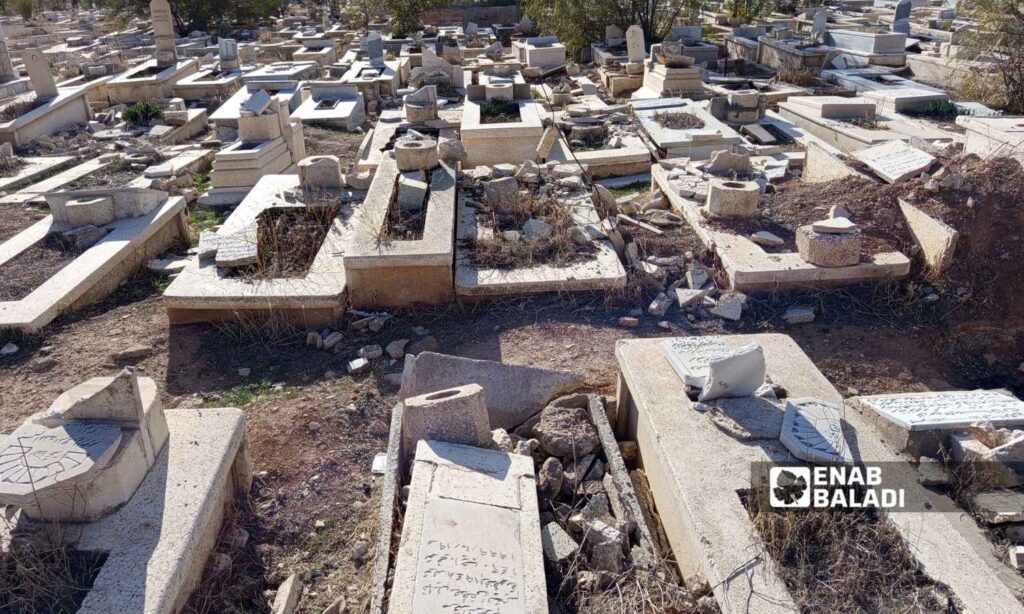Enab Baladi – Bisan Khalaf
“Every Eid holiday, I wished to visit my brother’s grave in the new Martyrs’ Cemetery in the Yarmouk camp, but I couldn’t recognize his grave; the cemetery’s features are completely unclear, as if they sought revenge on both the dead and the living,” says Palestinian-Syrian Ahmad al-Sahli to Enab Baladi. He fled to Sweden and returned to Syria after the regime’s fall to visit his brother’s grave, who was killed in the massacre at Abdul Qadir al-Husseini Mosque in the Yarmouk camp.
In Jobar neighborhood, activist Alaa al-Jaradat, who participated in the Palestinian-Syrian movement in 2012 and returned from Germany, states, “The Jobar neighborhood cemetery is not much different from the Yarmouk camp cemetery. I tried for a month and a half to find my father’s grave there, but I could not.”
Returnees to Syria find it difficult to locate the graves of their loved ones after the previous Syrian regime inflicted destruction on the cemeteries.
The most intense attacks were the heavy shelling on the Martyrs’ cemeteries in the Yarmouk camp and Jobar cemetery in Damascus during military campaigns launched in 2018.
Attempts to search
“I try to rely on my memory to recognize the graves,” says the grave digger in Jobar, Saleh al-Ma’arani, to Enab Baladi.
Al-Ma’arani has helped dozens of people identify their loved ones’ graves in the Jobar cemetery, relying on his memory and some documents containing information about the grave owners that he kept at home.
The scene is different in the Martyrs’ cemetery in the Yarmouk camp, where families undertake the search for their loved ones’ graves.
Ahmad al-Sahli stated that he is trying to look for destroyed gravestones in the hope of finding his brother’s name on one of them and is also attempting to match old photos of his brother’s grave with the cemetery’s current appearance.
Rehabilitation of Jobar cemetery
Jasim Hussein, the humanitarian sector supervisor in the Damascus governorate, clarified to Enab Baladi that they have identified the identities of only about 20% of the graves in the Jobar cemetery.
He added that the governorate has formed a committee in Jobar neighborhood and a burial office to rehabilitate the cemetery.
As for the new cemetery in the Yarmouk camp, the governorate has numbered it according to the actual sequence, according to Jasim Hussein.
Hussein confirmed that the burial office has no connection with the new cemetery in the Yarmouk camp due to the absence of records for it in the burial office, and burials currently take place through grave diggers authorized by the Jobar neighborhood committee.
Destruction of the old Yarmouk cemetery due to regime shelling, February 20, 2025 (Enab Baladi/Bisan Khalaf)
Exhumation of the old Yarmouk cemetery
“My father was martyred in Lebanon in 1991 when I was only one year old. We used to visit his grave every holiday, and I waited eight years to visit him again, but the regime did not allow us to enter.”
This is what Palestinian-Syrian Bisan Shihabi said, whom Enab Baladi met while searching for her father’s grave in the old Yarmouk camp cemetery.
Shihabi added that her family had heard about an attempt by Russian forces to exhume the old Martyrs’ Cemetery in the Yarmouk camp, which made her lose hope of visiting her father’s grave again.
Nayel Hamid, a member of the Yarmouk Camp Relief Committee, told Enab Baladi that in 2020, Russian forces deployed near the “Martyrs of the Palestinian Revolution” cemetery, setting up tents around a group of graves with the assistance of a medical team to search the cemetery. Additionally, they prevented civilians from visiting it.
According to Hamid, anyone who approached the cemetery would be arrested by the Palestine security branch, which was responsible for the Yarmouk camp at the time.
In 2020, the Russian army began search operations in the old Yarmouk camp cemetery for Palestinian refugees in Damascus, attempting to find the remains of two Israeli soldiers missing since 1982, according to the Israeli newspaper Times of Israel.
At that time, the regime denied any knowledge regarding the search for the remains of the Israeli soldiers, claiming that this was fresh evidence of the cooperation between terrorist groups and Mossad.
War remnants in the Yarmouk cemetery
Jasim Hussein, the humanitarian sector supervisor in the Damascus governorate, confirmed to Enab Baladi that there have been no recent cases of grave exhumation, and no grave digger has reported any exhumation in cemeteries under the burial office.
He added that there is currently no plan regarding the old Martyrs’ Cemetery in the Yarmouk camp, and it has not been entered at all, as it has not been cleaned from the remnants of mines.
The Syrian regime forces have prevented the families in the Yarmouk camp in Damascus from visiting the old Martyrs’ Cemetery, while burial operations continued in the Jobar cemetery.
The Yarmouk camp witnessed battles between factions of the Free Syrian Army and the regime forces, amid a division among Palestinian factions between both sides, before the Islamic State group took control of two-thirds of the camp in 2015.
Meanwhile, Jobar neighborhood, which once housed over 300,000 people, faced siege and chemical weapon attacks by the regime forces.

